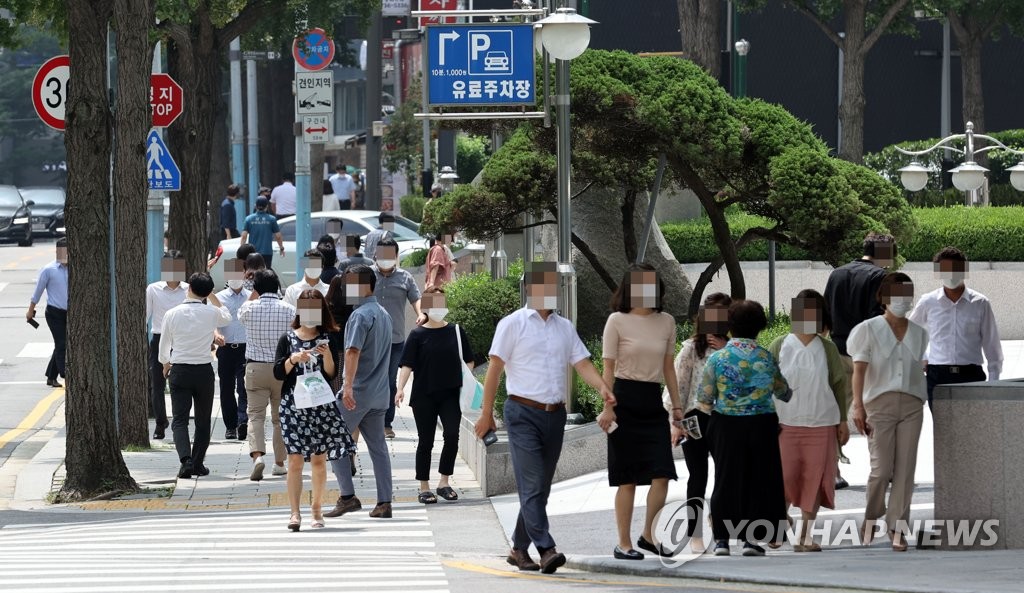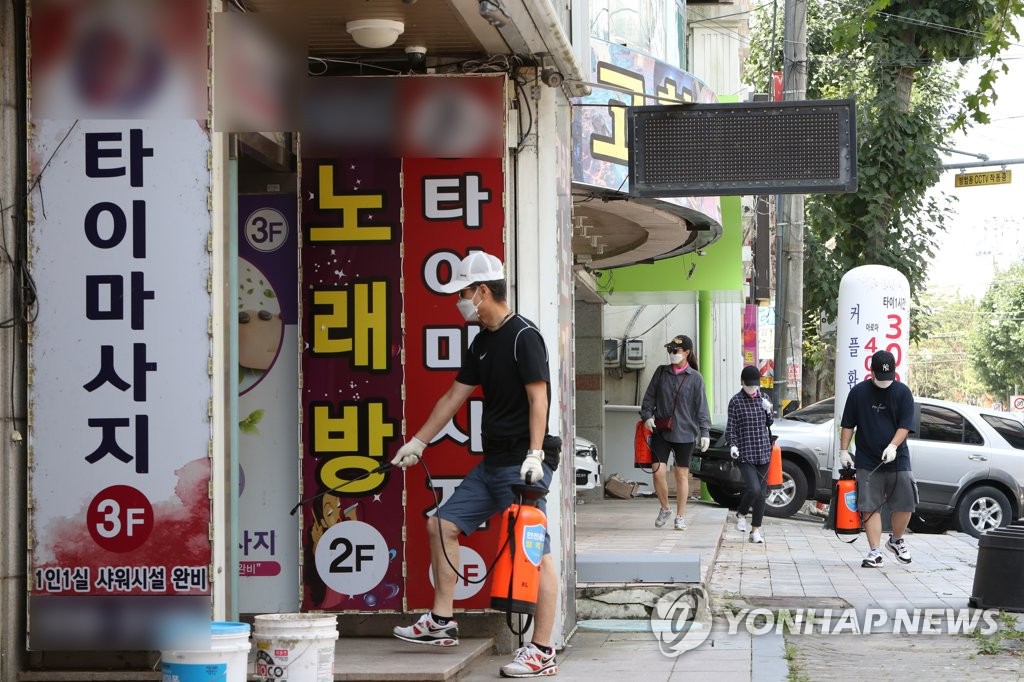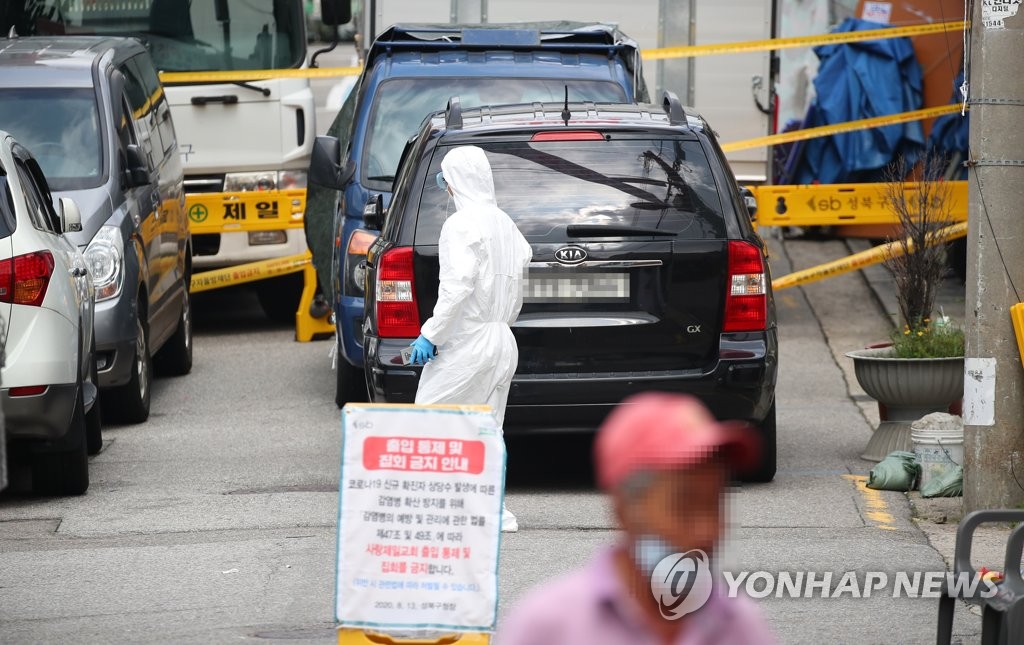- California Assembly OKs highest minimum wage in nation
- S. Korea unveils first graphic cigarette warnings
- US joins with South Korea, Japan in bid to deter North Korea
- LPGA golfer Chun In-gee finally back in action
- S. Korea won’t be top seed in final World Cup qualification round
- US men’s soccer misses 2nd straight Olympics
- US back on track in qualifying with 4-0 win over Guatemala
- High-intensity workout injuries spawn cottage industry
- CDC expands range of Zika mosquitoes into parts of Northeast
- Who knew? ‘The Walking Dead’ is helping families connect
S. Korea adopts enhanced anti-virus steps amid another looming wave of coronavirus cases
South Korea on Tuesday enhanced social-distancing guidelines as the number of new virus cases bounced back over 200, straining the country’s virus fight.
The country added 246 more COVID-19 cases, including 235 local infections, raising the total caseload to 15,761, according to the Korea Centers for Disease Control and Prevention (KCDC).
It was the fifth straight day with more than 100 cases, following 166 on Saturday and 103 Friday.
On Sunday, South Korea reported a whopping 279 new daily infections, marking the first time since early March that the figure surpassed 200. The figure fell back to 197 on Monday.
The country, which never had imposed a draconian lockdown, has been struggling to curb the spread of the virus while maintaining most business and daily activities.
As the new daily cases spiked, health authorities decided to raise the level of social distancing in Seoul and the surrounding Gyeonggi Province by one notch to Level 2 in the three-tier system for two weeks from Sunday.
South Korea said Tuesday the measure will be expanded to Incheon, just west of Seoul as well.
The scheme will still allow South Koreans to maintain most of their daily routines, but outdoor gatherings of more than 100 people will be strictly restricted. Sports events will be allowed without spectators. Any indoor meetings of 50 or more people are restricted as well.
The so-called risk-prone facilities, including karaoke rooms, clubs, PC cafes, and buffets will be ordered to shut down. The same goes for public facilities.
“If the situation is not brought under control despite the stricter measure, (the government) will swiftly raise the level of social distancing,” Kim Sang-jo, presidential chief of staff for policy, told cable network JTBC.



Citizens wearing protective masks walk on a street in central Seoul on Aug. 18, 2020. (Yonhap)
Of the newly identified local infections, 131 cases were reported from the capital city of Seoul, and 52 from the surrounding Gyeonggi Province.
Incheon, just west of Seoul, added 18 more cases.
Later in the day, the Seoul city government said 110 new cases were confirmed in the city Tuesday as of 6 p.m. Of them, 70 cases were traced to the Sarang Jeil Church in northern Seoul, a new hotbed for cluster infections.
A virus patient who earlier visited the church was found to have attended religious services at a Methodist church in northeastern Seoul last week. The church has some 140,000 congregants.
Infections tied to the Sarang Jeil Church have spiked to 457, up 138 from a day earlier, according to the health authorities. Those aged 60 and above accounted for nearly 40 percent.
Of the church-traced cases, the capital city of Seoul accounted for 282, trailed by the neighboring Gyeonggi Province with 119. There were also 25 patients outside greater Seoul, underscoring that the church-related virus cases have spread fast across the nation.
The cases not only cover church members, but also second-stage transmissions at call centers and senior nursing homes, the KCDC said.
Health authorities said they have carried out tests on 2,500 church members so far and are currently tracking the whereabouts of around 800 members. Some 15 percent of the church members tested were confirmed to have been infected with the virus.
South Korea said all people who participated in a large-scale anti-government rally held on Saturday should visit the nearest clinics to be tested, as some church members infected with the virus attended the demonstration.
Following the enhanced distancing guideline announced on Tuesday, churches in the greater Seoul area will not be allowed to have in-person worship services.
Previously, South Korea only asked churchgoers in the region to refrain from holding gatherings other than regular worship services.
Other sporadic cluster infections continued as well.
A police station in central Seoul reported four patients so far, up four from a day earlier.
A total of seven patients were confirmed from a Starbucks store in Paju, north of Seoul, on Monday, raising the total number of cases tied to the coffee shop to 49.
In the southern port city of Busan, a vocational high school reported two more patients, raising the related caseload to 17.
“This week will be a critical juncture for the country’s virus fight as cluster infections in the greater capital area are on the brink of spreading nationwide,” Vice Health Minister Kim Ganglip said in a regular press briefing.
Kwon Jun-wook, a senior health official, echoed the view, urging all people to stay home for the time being.
“If we do not curb the spread of the virus this week, not only the greater Seoul area with a population of 25 million will come under threat, but our everyday lives may come to a halt,” Kwon said.
Health authorities added that over the past week, each COVID-19 patient in the greater Seoul area has infected an average of 1.78 people.
“The current situation is so grave that we have to consider adopting tougher (infection preventive) measures.” Health Minister Park Neung-hoo said in a pan-government meeting on infection prevention. “Anyone in the capital city and neighboring areas can be infected, and it is worrisome that the virus outbreak may spread across the country.”
Should the highest level of distancing rules be imposed, gatherings of more than 10 people will be banned. South Koreans will then face the most intense restrictions in their everyday lives since the country detected its first COVID-19 case on Jan. 20.
Health authorities are concerned over the latest spike in the number of cases traced to churches, as it resembles that of the Shincheonji Church of Jesus, a minor religious sect, which was the epicenter of the country’s first wave of the virus outbreak.
Thousands of followers, most of whom were from its branch in the southeastern city of Daegu, were infected with the virus. Due to the cluster infections, the country’s new daily virus cases peaked at 909 on Feb. 29.
South Korea, meanwhile, reported one more death, raising the toll to 306. The fatality rate came to 1.94 percent.
The country added just 11 imported cases on Tuesday, with France accounting for two cases. There were also infections among arrivals from the United States, the Philippines, Pakistan, and Ethiopia.
South Korea, which has a population of roughly 51 million, carried out 1,697,042 tests since Jan. 3.
The total number of people released from quarantine after making full recoveries stood at 13,934, up 17 from the previous day.
The latest infections in the Seoul metropolitan area are believed to be the so-called GH genetic strain of the new coronavirus, which is more infectious compared to that found among Shincheonji-linked cases, according to health authorities.
The KCDC added remdesivir, an experimental drug conventionally used for Ebola, has been administered to 128 coronavirus patients in critical condition at 35 hospitals across the country.











